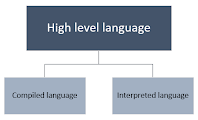High level languages
High level languages – advantages and disadvantages
High level language is abbreviated as HLL. High level languages are similar to the human language. Unlike low level languages, high level languages are programmers friendly, easy to code, debug and maintain.
High level language provides higher level of abstraction from machine language. They do not interact directly with the hardware. Rather, they focus more on the complex arithmetic operations, optimal program efficiency and easiness in coding.
Low level programming uses machine friendly language. Programmers writes code either in binary or assembly language. Writing programs in binary is complex and cumbersome process. Hence, to make programming more programmers friendly. Programs in high level language is written using English statements.
High level programs require compilers/interpreters to translate source code to machine language. We can compile the source code written in high level language to multiple machine languages. Thus, they are machine independent language.
Today almost all programs are developed using a high level programming language. We can develop a variety of applications using high level language. They are used to develop desktop applications, websites, system software’s, utility software’s and many more.
High level languages are grouped in two categories based on execution model – compiled or interpreted languages.

Classification of high level language on the basis of execution model
We can also classify high level language several other categories based on programming paradigm.

Classification of high level language on the basis of paradigm
Advantages of High level language
1.High level languages are programmer friendly. They are easy to write, debug and maintain.
2.It provide higher level of abstraction from machine languages.
3.It is machine independent language.
4.Easy to learn.
5.Less error prone, easy to find and debug errors.
6.High level programming results in better programming productivity.
Disadvantages of High level language
1.It takes additional translation times to translate the source to machine code.
2.High level programs are comparatively slower than low level programs.
3.Compared to low level programs, they are generally less memory efficient.
4.Cannot communicate directly with the hardware.
